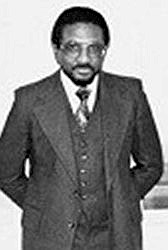Norman Parish
Norman Parish | |
|---|---|
 | |
| Born | August 26, 1937 New Orleans, Louisiana, U.S. |
| Died | July 8, 2013 Germantown, Maryland, U.S. |
| Nationality | American |
| Alma mater | Art Institute of Chicago |
| Occupation(s) | Artist, Art dealer |
Norman Parish (born New Orleans, raised in Chicago [1] August 26, 1937 - July 8, 2013)[2] was an American artist and art dealer. He was the founder and director of the Parish Gallery (founded in 1991[2][3][4]) in the Georgetown neighborhood of Washington, DC. The gallery was described by The Washington Post as an art gallery "that spotlighted African American artists at a time when few other galleries concentrated on showing their work."[2][5]
Education
Parish studied at the Art Institute of Chicago[6] and the University of Chicago.[1]
Early life and artwork
Early in his career as an artist in Chicago, Parish was part of a politically active group of African American artists in Chicago, some of whom were later part of the AfriCOBRA (African Commune of Bad Relevant Artists) group founded in 1968 by artists Wadsworth Jarrell and Jeff Donaldson, who both taught at Howard University.[7] In the late 1960s, Parish and more than a dozen politically active African American artists in Chicago created a then controversial mural, known as The Wall of Respect,[8][9][10] in Chicago’s South Side which 40 years later is now "credited with sparking the creation of other ethnic murals around the world."[7] The mural was also celebrated by the Pulitzer Prize-winning poet Gwendolyn Brooks in one of her poems: “The Wall.”[9]
Parish moved to Washington, DC in 1988 and opened the Parish Gallery in 1991. “It’s because I found out how many artists there were that needed support,” says Norman. “They were good, really good. But they needed someone to help get their work out into the world”, he recalled in an interview in 2013.[9]
“At first, a lot of the artists we featured I knew from art school,” he added in the same interview. “But around 93 and 94, other artists just started coming to me. These were artists missing opportunities because nobody was looking out for them, nobody was out there promoting their work.”[9]
Parish Gallery
Norman Parish's Georgetown gallery "became one of the country’s best-known black-owned art galleries, with a focus on works by African Americans and other artists of what is known as the African diaspora."[2]
Over the years that the gallery was opened, it showcased the work of more than 170 artists from the United States, Nigeria, Ethiopia, Ghana, South Africa and Morocco, alongside those from Greece, Turkey, Brazil, Spain, and France,[9] including such well-known artists as Sam Gilliam, Richard Mayhew, Lou Stovall, Percy Martin, Evangeline Montgomery, Victor Ekpuk, Lois Mailou Jones,[11] and Wadsworth Jarrell.[2]
References
- ^ a b O'Neal Parker, Lonnae (2013-06-20). "Parish Gallery pays tribute to its namesake". The Washington Post. Retrieved 2019-02-19.
- ^ a b c d e Schudel, Matt (2013-07-09). "Norman Parish, artist and gallery owner, dies at 75". The Washington Post. Retrieved 2019-02-17.
- ^ "Obituary: Norman Parish, Gallery Owner and Artist". Germantown, MD Patch. 2013-07-15. Retrieved 2019-02-18.
- ^ "Norman Parish, painter whose gallery highlighted black artists, dies at 75 - The Boston Globe". BostonGlobe.com. Retrieved 2019-02-18.
- ^ "Norman Parish (1937–2013)". www.artforum.com. 10 July 2013. Retrieved 2019-02-18.
- ^ "Black Pride Whitewashed". The Art Institute of Chicago. 1971. Retrieved 2019-02-20.
- ^ a b Norman, Parish III (2015-04-17). "Tribute to a long-gone mural and a father who helped create it". The Washington Post. Retrieved 2019-02-17.
- ^ "SAIC Hosts Event to Launch Conversation Leading up to 50th Anniversary of Chicago's Wall of Respect". School of the Art Institute of Chicago. Retrieved 2019-02-18.
- ^ a b c d e Tischler, Gary (2013-06-20). "The Parish Gallery, 22 Years Strong". The Georgetowner. Retrieved 2019-02-18.
- ^ Preston, Rohan B. (1997-08-27). "DEEP ROOTS". Chicago Tribune. Retrieved 2019-02-18.
- ^ Protzman, Ferdinand (1996-06-29). "A PLACE TO HANG HIS ART". The Washington Post. Retrieved 2019-02-17.
